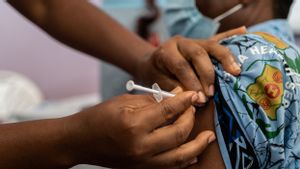JAKARTA - Future pandemics could be more deadly than COVID-19, so lessons from this outbreak should not be wasted with the world having to make sure it's ready for the next virus attack, says Oxford-AstraZeneca vaccine co-creator.
The new coronavirus has killed 5.26 million people worldwide, according to Johns Hopkins University, wiping out trillions of dollars in economic output and reversing lives for billions.
"The truth is, the next one could be worse. It could be more infectious, or more deadly, or both," Sarah Gilbert said in the Richard Dimbleby Lecture, citing Reuters from the BBC on December 6.
"This is not the last time the virus threatens our lives and livelihoods," she stressed.
Gilbert, a professor of vaccinology at the University of Oxford, said the world must ensure it is better prepared for the next virus.
"The progress we have made and the knowledge we have gained cannot be lost," she said.
Efforts to end the COVID-19 pandemic are uneven and fragmented, characterized by limited access to vaccines in low-income countries, while the 'health and wealth' in developed countries get a boost, health experts criticize.
Meanwhile, a panel of health experts set up by the World Health Organization (WHO) to review the handling of the SARS-CoV-2 pandemic has called for permanent funding, as well as greater ability to investigate the pandemic through a new agreement.
One of the proposals is for new financing of at least USD 10 billion per year for pandemic preparedness.
The COVID-19 outbreak was first detected in China in late 2019. Vaccines were developed to fight the virus in a short period of time.
Professor Gilbert said the spike protein of the Omicron variant contained a mutation known to increase viral transmission.
SEE ALSO:
"There are additional changes that may mean antibodies induced by the vaccine, or by infection with other variants, may be less effective in preventing Omicron infection," Gilbert said.
"Until we know more, we must exercise caution, and take steps to slow the spread of this new variant."
The English, Chinese, Japanese, Arabic, and French versions are automatically generated by the AI. So there may still be inaccuracies in translating, please always see Indonesian as our main language. (system supported by DigitalSiber.id)

















